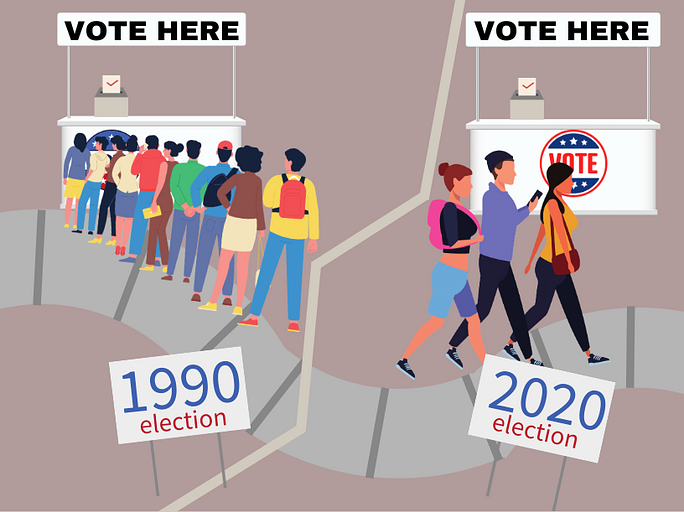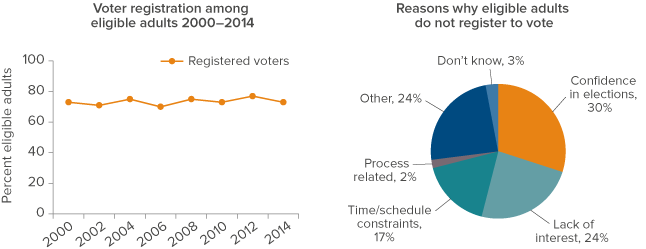Voter turnout has been decreasing in recent years, most notably in local and state elections.
Democracy’s missing piece: Local and state elections suffer from voter apathy
May 30, 2023
Ron DeSantis, Republican governor of Florida since 2019, announced his bid for the presidency last week. Since then, several media outlets have covered his policies, his connection to multi-billionaire Elon Musk, and what his run could mean for both the Republican party and the presidential race as a whole. Many citizens across the country have become opinionated on the topic through whatever medium they get information from, be it cable news, Twitter, or even word-of-mouth. What fewer citizens seem to be invested in, however, are the elections that take place before this.
How Elections Work
An important part of the presidential election is selecting the front-runners to represent the two major political parties. Technically, one could vote for whatever candidate they want through write-in ballots, but in practice, the fight for the presidency is between the Republican (or GOP) candidate and the Democratic candidate. These candidates are selected through the general primary elections, a critical part of the process.
These elections are incredibly important due to the fact that they determine who the runners will be in November. Because of this, one would assume that the voter turnout for the primaries and the presidential election would be similar. However, the difference here is staggering.
The Disparity between Presidential and Non-Presidential Elections
According to the DuPage Election Division, voter turnout for the 2020 presidential election in DuPage County was 76.6%. For the 2020 general primary, taking place just eight months prior, it was 25.6%. In terms of ballots, that is well over 300,000 people who participated in the presidential election but not the primary.
Clint Brown was an election judge — someone who manages the polling station and maintains the integrity of an election — in the 2023 consolidated election.
“I feel that people, especially young people, may believe that the primaries and other elections are not as important as the presidential election,” Brown said. “It could be by design; I am not sure. Maybe they do not realize that these elections are just as — if not more — important than the presidential.”
Voter Apathy’s Impact on Elections
Public Policy Institute of California
Voter apathy has many causes, ranging from time-constraints to a lack of interest in the democratic process in general.
One of the contributors to voter apathy may be the sensationalism that a presidential election brings. Social media and news channels help spread soundbites and catchy headlines about each candidate, riling up a sense of urgency to do one’s civic duty. It also helps to swiftly and efficiently educate the masses on the candidates’ individual politics.
For primaries, however, there is not nearly the same sense of community enthusiasm. This leads to many voters not knowing anything about the differences in values between the runners, leading to the minority who do care being the only ones to cast a vote.
Tim Elliot has been an election judge in every DuPage County election since 2012. He was the chief election judge for the 2023 consolidated election.
“There is definitely a barrier in getting people to go vote when they do not have any idea what each candidate stands for,” Elliot said. “There is a lot of research involved, and many voters do not have the time or energy to do that kind of research. The best these primary candidates can hope for is for people to recognize their party on those election signs on the side of the road. Even then, that is not a great system to determine who will be running our communities and country [as a whole].”
Primaries are not the only kind of election that receive little interest from the public, however. State and local governments rely on voters to determine who will fill each position, too. Despite these institutions having a greater influence on the life of the average citizen compared to the federal government, even fewer voters show up to cast their ballots. The 2022 general election, which was used to determine who would fill the state-level offices (governor, treasurer, state senators, etc.) had a turnout of 55.8%.
The Cause of Voter Apathy
This difference could be explained by some voting-age young people feeling a sense of voting apathy. This could manifest as a line of thinking where one believes it is not worth the time or energy to vote when the system is biased from the start. Senior Joshua Romauld understands why people feel this way.
“People are very passionate about issues like abortion and gun control,” Romauld said. “They care about what happens nationally and how that affects them. Maybe the majority of voters do not understand that the small decisions local boards and governments make have a dramatic influence on their daily lives.”
Elliot believes that the disconnection between the two is at least partially caused by a lack of understanding of how important state and local governments are to the lives of citizens.
“People want to make their voices heard, but they do not know how,” Elliot said. “Most of the time, they believe that things like the City Council are set-in-stone or insignificant in terms of changing policy. They do not understand just how much they can influence these institutions to start social change.”
Elliot’s perception of the significance of local elections mirrors that of many professionals in political science. According to the Harvard Political Review, the quality-of-life of everyday citizens is impacted far more by local leaders than by federal bureaucrats. As an example, while citizens may have little individual control over issues like national gun control or taxation rates, they do have extraordinary influence over whether their local leaders improve the infrastructure of local roadways or repair contaminated water supply systems. Citizens hold much greater personal power when it comes to selecting their local leaders, but as the Review notes, the media largely focuses on national issues rather than local ones, which drives the focus away from issues closer to home.
The Solution to the Voter Apathy Epidemic
Unfortunately, the issue of how to get more voters in the booth for non-presidential elections remains unsolved. In Brown’s opinion, voters, especially young ones, do genuinely care about policy that affects them, but simply do not know how to effectively engage with the political system.
“It feels as though there is a cycle where we have to wait for another tragedy to happen before people can spur any change,” Elliott said. “Then the enthusiasm for change wears out quickly, nothing ends up happening, and the cycle repeats itself again. Do we need to wait for this to happen again before we collectively agree to do something about it? I wish I had the answer.”
Brown feels that better education and knowledge of how the political system works could help motivate younger people to engage instead of falling into apathy.
“We definitely need more civic lessons in school,” Brown said. “Young adults need to understand how elections impact them as they grow and become more independent. So many of these kids are going to college and are forced to take out heavy student loans, which is something that they could petition to change for the better with enough of a concerted effort.”
While it does seem like voter apathy is on the rise and few people engage with local elections anymore, Brown notes that the problem may be circular from generation to generation.
“Lots of kids will say ‘Oh, these old-schoolers, they can not understand the times now,’” Brown said. “The newer generation always feels that the world they live in now is inaccessible to older folk, when in reality they may have wisdom that could be helpful for these kids.”
Ultimately, there is not much an individual can do to fix widespread voter apathy in a swift and efficient way. It takes time to unlearn the idea that local and state elections do not matter and that there is no point in casting a vote. There is, however, one action that people can take individually to start progressing towards a more efficient democracy.
“Pay attention and stay focused on what is important,” Brown said. “Whatever side of the political coin you are on, just get out there and vote.”


